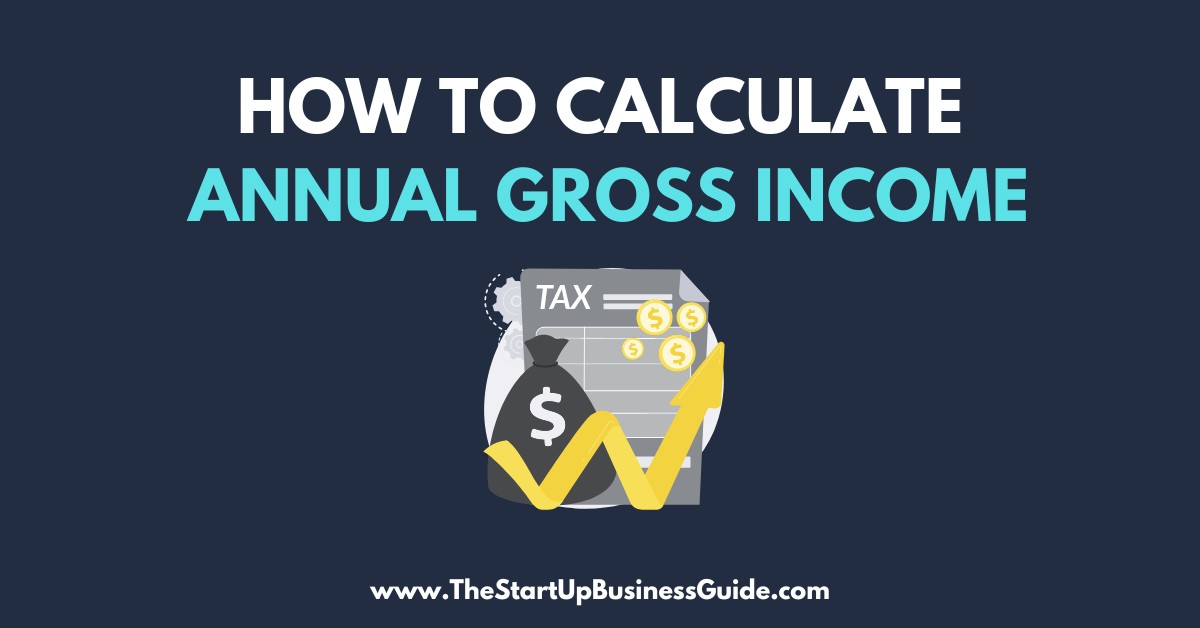How to Calculate Annual Gross Income

Gross income is an important number to know for both individuals and businesses.
It is the total amount of money earned before any deductions or taxes are taken out.
Understanding your gross income can help you make better financial decisions, such as budgeting and saving for retirement.
In this article, we will define gross income, explain the difference between gross income and net income, and provide step-by-step instructions on how to calculate gross income.
We will also discuss common mistakes to avoid when calculating your gross income and provide additional resources for further learning.
Definition of Gross Income
Gross income is the total amount of money earned before any deductions or taxes are taken out.
This includes all sources of income such as salary, wages, bonuses, self-employment income, investment income, and other sources of income such as pensions or social security.
For example, if you earn a salary of $60,000 per year and have a $10,000 bonus, your gross income for the year would be $70,000.
If you also have rental income of $12,000, your gross income would increase to $82,000.
It’s important to note the difference between gross income and net income.
Net income is the amount of money you take home after deductions and taxes have been taken out.
In other words, net income is gross income minus deductions and taxes.
How to Calculate Gross Income
Calculating your gross income is relatively simple, but it can be a little more complicated if you have multiple sources of income.
Here’s a step-by-step guide on how to calculate your gross income:
- Calculate your income from employment. This includes your salary, wages, and bonuses. If you have multiple jobs, be sure to add up all of the income from each job.
- Calculate your income from self-employment or freelance work. This includes any money earned from running your own business or doing freelance work. Be sure to include all revenue and any reimbursements or advances.
- Calculate your income from investments. This includes dividends, interest, and rental income.
- Calculate your income from other sources. This includes pensions, social security, and any other sources of income.
- Add up all of your income from each source to get your gross income.
For example, if you earn a salary of $60,000, have a $10,000 bonus, $12,000 in rental income, and $5,000 in dividend income, your gross income would be $87,000.
Common Mistakes to Avoid
When calculating your gross income, it’s important to be careful and avoid common mistakes.
Here are a few things to keep in mind:
- Don’t forget to include all sources of income. It’s easy to overlook small sources of income, but they can add up quickly. Be sure to include all income, no matter how small.
- Don’t forget to account for deductions and exemptions. Deductions and exemptions can lower your gross income and affect your taxes. Be sure to consult a tax professional or use a tax calculator to ensure you’re accounting for all deductions and exemptions.
- Don’t forget to keep accurate records. Accurate records are essential for calculating your gross income. Be sure to keep track of all income and expenses, and save any receipts or invoices that may be needed.
Conclusion
Knowing your gross income is important for making financial decisions and preparing your taxes.
By understanding how to calculate your gross income and avoiding common mistakes, you can ensure that your calculations are accurate.
Further, be sure to consult a tax professional or use online resources to stay informed on tax laws and deductions.
Remember to keep accurate records and consider all sources of income, including self-employment, investments, and other sources, such as pensions or social security.
By staying informed and keeping accurate records, you can make better financial decisions and plan for a successful future.
Frequently Asked Questions on Annual Gross Income
Some important FAQs for you:
What is considered gross income?
Gross income refers to all sources of income earned or received before any deductions or expenses are taken into account.
It includes wages, salaries, bonuses, commission, and self-employment income.
How do I calculate my annual gross income?
To calculate your annual gross income, add up all the income you earned or received in a year from all sources.
This includes wages, salaries, bonuses, commission, self-employment income, and any other sources of income.
Can I include my rental income in my annual gross income?
Yes, rental income is considered a source of income and should be included in your annual gross income calculation.
Are there any income sources that should not be included in my annual gross income calculation?
Income sources that are not considered taxable, such as certain types of government assistance, should not be included in your annual gross income calculation.
Do I need to include capital gains in my annual gross income calculation?
Yes, capital gains from the sale of assets such as stocks or real estate should be included in your annual gross income calculation.
How do I calculate my annual gross income as a self-employed individual?
As a self-employed individual, your annual gross income is calculated by adding up all the income you earned from your business or self-employment activities before any deductions or expenses are taken into account.
Can I include my investments income in my annual gross income?
Yes, income from investments such as dividends, interest, and capital gains should be included in your annual gross income calculation.
Can I include my Social Security benefits in my annual gross income?
Social Security benefits may be included in gross income and taxed, depending on your filing status and other factors.
Can I include my unemployment benefits in my annual gross income calculation?
Yes, unemployment benefits are considered a source of income and should be included in your annual gross income calculation.
How do I calculate my annual gross income if I have multiple jobs?
To calculate your annual gross income if you have multiple jobs, add up all the income you earned from each job before any deductions or expenses are taken into account.
Will my annual gross income change if I move to another state?
It depends on the state you move to and the income sources you have. Some states have different tax laws and rates which may affect your annual gross income.
It’s recommended to consult a tax professional or check the state’s tax laws before making any decisions.
Additional Resources
For more information on gross income and taxes, check out the following resources:
- The IRS website (www.irs.gov) has a wealth of information on taxes, including information on deductions and exemptions.
- Online tax calculators, such as TurboTax or H&R Block, can help you estimate your taxes and identify potential deductions.






